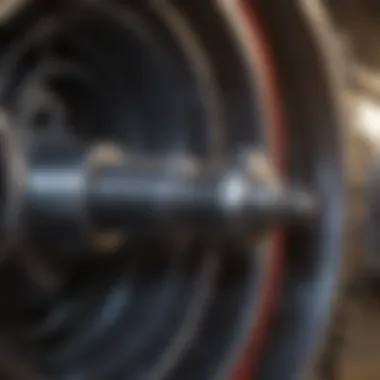SS Carriage Bolts: Essential Fasteners for Agriculture


Intro
In the agricultural sector, efficiency and durability are paramount. For farmers and agronomy professionals, every detail matters, from the tools used to the materials selected for construction and repair. Stainless steel (SS) carriage bolts are one such material that has gained attention for its robust properties and versatility. This guide delves into the significance of SS carriage bolts, their specific applications in agriculture, and the best practices for their selection and installation. Through careful examination, this article aims to provide valuable information that can help enhance productivity and sustainability in agricultural operations.
Overview of the Topic
Definition and Importance
SS carriage bolts are a type of fastener featuring a smooth, rounded head and a square or hexagonal neck, designed to embed itself into the material it is driven into. Made of stainless steel, these bolts resist rust and corrosion, making them particularly suited for the demanding environments of agricultural settings.
The use of SS carriage bolts is vital in various agricultural contexts where reliable fastening is crucial. For instance, they are commonly employed in constructing barns, fences, and managing equipment. Their inherent durability ensures that structures can withstand harsh weather conditions and heavy loads without the risk of failure.
Current Trends
Currently, there is a shift towards sustainable materials in farming practices. Farmers are increasingly looking for fasteners that not only perform well but also have a lower environmental impact. SS carriage bolts align with this trend as they offer longevity and recyclability. Additionally, the rise of precision agriculture has increased the demand for high-quality materials that enhance efficiency, where the need for reliable fastening becomes even more critical.
Key Techniques and Practices
Step-by-Step Guide
- Choosing the Right Size: Select a bolt length that accommodates the thickness of the materials you’re fastening. A bolt too short will not secure the materials effectively.
- Preparing the Hole: Drill a hole with a diameter that allows for easy insertion of the bolt without stripping the threads.
- Inserting the Bolt: Insert the bolt through both materials, ensuring the square neck is seated in the material to prevent spinning.
- Securing with a Nut: Thread a suitable nut onto the end of the bolt. Tighten it properly to ensure a secure fit.
- Inspection: After installation, inspect to confirm the bolt is flush and secure in place.
Tools and Equipment Needed
To effectively work with SS carriage bolts, having the right tools is essential. Below is a list of necessary equipment:
- Drill: For creating holes in various materials.
- Wrenches: To tighten the nuts securely around the bolts.
- Screwdrivers: Useful for adjustments and initial insertion.
- Hammer: Sometimes needed for driving in nuts or washers as necessary.
Challenges and Solutions
Common Obstacles
Despite the advantages of SS carriage bolts, users often face challenges, such as bolt corrosion due to improper selection or installation. In addition, stripping of threads can occur when inadequate hole preparation precedes fastening.
Innovative Solutions
To overcome these issues, it is crucial to choose high-quality stainless steel bolts specifically designed for agricultural environments. Furthermore, employing appropriate drilling techniques can prevent stripping. Using anti-seize lubricants can also help combat corrosion, extending the lifespan of the installation.
Important: Consistent maintenance and periodic inspection of your fastenings are recommended to ensure ongoing durability and reliability, particularly in dynamic agricultural settings.
Engaging with the right resources and practicing effective techniques will enhance long-term productivity and sustainability in agricultural practices. Armed with this guide, professionals can confidently integrate SS carriage bolts into their operations, maximizing efficiency in their work.
Prelude to SS Carriage Bolts
SS carriage bolts play a crucial role in agriculture, serving as essential fastening devices across various applications. Their unique design and properties make them especially suited for outdoor environments where durability and resistance against environmental factors are paramount. The choice of fasteners can greatly impact the longevity and reliability of agricultural equipment. Thus, understanding the significance of SS carriage bolts is not merely comparable to choosing any other fastener, but rather it reflects a commitment to operational efficiency and sustainability.
Definition and Characteristics
SS carriage bolts, or stainless steel carriage bolts, have a rounded head with a square section just below it. This design prevents the bolt from turning when a nut is applied. They are typically used in wooden applications, but their versatility allows them to be employed in metal assemblies as well.
The most notable characteristics of SS carriage bolts include:


- Corrosion Resistance: Made from stainless steel, these bolts resist rust and corrosion, making them ideal for agricultural settings where moisture and chemicals are often present.
- Strength: These bolts offer high tensile strength, ensuring that they can withstand significant loads without failure.
- Ease of Use: The design is user-friendly, facilitating easy installation, even in tight spaces.
SS carriage bolts also have grades, denoting their strength and standards. Typically, grade 304 and grade 316 are common, with 316 having enhanced corrosion resistance, which can be vital in coastal or extreme environments.
Comparison with Other Fasteners
When evaluating different types of fasteners, SS carriage bolts hold distinct advantages over others.
- Versus Regular Steel Bolts: While regular steel bolts may suffice in dry environments, they quickly succumb to corrosion in moist conditions. SS carriage bolts remain robust due to their stainless composition.
- Versus Lag Screws: Lag screws provide a strong holding power but generally require pre-drilled holes. Carriage bolts do not have this requirement, making them faster to install.
- Versus Other Types of Bolts (e.g., Hex Bolts): Hex bolts require a wrench for tightening, whereas carriage bolts can be installed with a simple square nut, catering to ease of use in many agricultural tasks.
To summarize, SS carriage bolts not only outperform many of their counterparts regarding durability and ease of use in agricultural practices, but they also offer flexibility in terms of installation and application. This understanding is crucial for farmers, horticulturists, and agronomy professionals aiming for operational excellence and sustainability in their workflows.
Material Properties of SS Carriage Bolts
Understanding the material properties of stainless steel (SS) carriage bolts is essential for their effective use in agriculture. Given the demanding environments often encountered in agricultural practices, it is crucial to select fasteners that can withstand various stresses. Stainless steel is known for its advantageous characteristics that directly contribute to the longevity and reliability of these fasteners. Farmers and agronomists can benefit from recognizing how these properties influence their decision-making and operations.
Corrosion Resistance
Corrosion resistance is one of the defining features of stainless steel carriage bolts. Agriculture presents unique challenges, including exposure to moisture, fertilizers, and chemicals that can lead to rapid degradation of traditional metals. Stainless steel bolts, especially those made from grades such as 304 or 316, demonstrate high resistance to rust and corrosion. This resistance is crucial for maintaining structural integrity, especially in environments like irrigation systems where water and moisture are common.
The use of stainless steel can prevent costly repairs and replacements that would otherwise arise from corroded fasteners. Farmers operating in coastal regions or areas with high humidity will find stainless steel carriage bolts particularly beneficial. Not only do they ensure longevity, but they also contribute to the overall sustainability of agricultural practices by minimizing waste.
Stainless steel's resistance to corrosion can significantly extend the lifespan of agricultural installations, making it a wise investment.
Strength and Durability
Strength and durability are paramount when selecting carriage bolts for agricultural implements. Stainless steel provides an excellent balance between strength and weight, allowing for robust constructions without excessive bulk. Carriage bolts made from stainless steel possess high tensile strength, enabling them to secure large pieces of equipment and withstand mechanical stresses effectively.
For applications requiring heavy-duty fastening, such as in tractors or large agricultural machinery, the durability of stainless steel bolts is essential. These fasteners can endure harsh conditions, vibrations, and loads that would typically lead to failure in weaker materials. The reduced risk of breakage not only provides safety but also minimizes downtime for farmers.
In summary, the material properties of stainless steel carriage bolts—including corrosion resistance and strength—play a vital role in agricultural applications. By understanding these attributes, users can make more informed choices that enhance the resilience and efficiency of their operations.
Applications in Agriculture
SS carriage bolts play a crucial role in the agricultural sector due to their unique properties and versatility. These bolts are particularly significant when building structures and equipment that withstand the rigors of agricultural use. Their design and material allow for ease of installation and a secure hold, which are essential in preventing equipment failure. This section explores how SS carriage bolts are applied in three key areas: the construction of agricultural equipment, use in irrigation systems, and application in greenhouses and structures.
Construction of Agricultural Equipment
The construction of agricultural equipment often requires robust fasteners, and SS carriage bolts fit this need perfectly. These bolts are used in machinery such as tractors, plows, and harvesters, where strength and reliability are paramount. Their smooth, rounded head design minimizes the risk of snagging, which is especially important in environments filled with vegetation and soil.
When selecting SS carriage bolts for equipment, the strength of the material should be considered. Stainless steel offers significant corrosion resistance, ensuring longevity in conditions that frequently involve moisture or chemicals. A few benefits of using SS carriage bolts in agricultural equipment construction include:
- Durability: SS carriage bolts resist rust and degradation, which is critical in agriculture.
- Structural Integrity: Properly installed bolts enhance the overall strength of the equipment.
- Ease of Maintenance: Regular inspections and easy replacement procedures make repairs straightforward and convenient.
Use in Irrigation Systems
Irrigation systems are vital in agriculture, providing necessary water supply to crops. SS carriage bolts are frequently used in constructing and maintaining these systems due to their resistance to corrosion and ability to hold components securely. In piping systems, they are essential for connecting different sections, ensuring that joints remain sealed under pressure.
The following aspects highlight the importance of SS carriage bolts in irrigation systems:
- Weather Resistance: Stainless steel's properties make it suitable for outdoor use where it might face various weather conditions.
- Leak Prevention: A tight sealing connection is crucial for efficient water transportation, and SS carriage bolts help achieve this.
- Adaptability: They can be used with many irrigation materials like PVC and metal, making them versatile.
Application in Greenhouses and Structures


In agricultural settings, greenhouses require a blend of durability and functionality. SS carriage bolts serve as fasteners in the construction and maintenance of greenhouses. They are instrumental in anchoring frames to foundations and securing panels in place. As greenhouses often have to endure various environmental conditions, the corrosion resistance of these bolts proves advantageous.
Key considerations for using SS carriage bolts in greenhouses include:
- Temperature Resistance: They can withstand high and low temperatures without compromising their structural integrity.
- Safety: Their secure fastening capabilities help prevent structural failures that could harm plants or equipment.
- Sustainability: By using durable materials, farmers can create long-lasting structures that require less frequent replacement.
"The right fasteners can greatly influence the longevity of agricultural structures. Choosing SS carriage bolts reflects an investment in quality and sustainability."
In summary, SS carriage bolts significantly enhance the functionality and sustainability of various agricultural practices. Whether in equipment, irrigation, or structures, their role cannot be underestimated. Proper application and selection of these fasteners lead to improved productivity and efficiency in agricultural operations.
Selecting the Right SS Carriage Bolt
Selecting the right SS carriage bolt is crucial for ensuring that agricultural machinery and structures remain safe and intact. With the variety of bolts available, farmers and agronomy professionals must consider specific elements to make an informed choice. The right size, length, and grade not only affect the performance of the setup but also influence long-term maintenance and functionality. Thus, understanding these factors is essential for effective agricultural practices.
Determining Size and Length
When determining the size and length of an SS carriage bolt, it is important to consider the specific requirements of your project. The size of the bolt must match corresponding holes and materials. For instance, if the bolt is too large, it may not fit into certain frameworks, whereas a too-small bolt can compromise the integrity of the structure.
Generally, SS carriage bolts are available in various diameters, typically ranging from 1/4 inch to 1 inch or more. The length of the bolt also plays a vital role. One should ensure that the bolt protrudes sufficiently beyond the nut while not excessively sticking out, as that can create hazards and lead to unexpected wear.
Here are some steps to follow when determining the size and length of the bolt:
- Measure hole diameter: Use calipers or a drill gauge to ensure a proper fit.
- Assess material thickness: The thickness of the materials being fastened will inform the required length of the bolt.
- Consider load requirements: If the assembly will bear significant weight or stress, selecting a longer and thicker bolt may be necessary.
Understanding Grades and Specifications
Understanding the grades and specifications of SS carriage bolts is vital when selecting the right product for agricultural applications. Different grades signify varying levels of strength and durability. For instance, a grade 2 bolt has the lowest strength, generally adequate for lighter applications, while a grade 8 bolt holds superior tensile strength, making it suitable for heavy-duty uses.
It is also important to consider specifications that are relevant to the operational environment:
- Corrosion resistance: As discussed previously, stainless steel offers excellent corrosion resistance. However, not all stainless steel is created equal. It is advisable to look for bolts that meet ASTM A193 or A320 standards for higher durability in agricultural settings.
- Head type: SS carriage bolts generally come with a square, rounded head. Selecting the right head type can affect both assembly and disassembly processes.
Understanding these elements allows agricultural professionals to choose bolts that not only meet structural needs but also enhance overall efficiency and longevity in working environments.
Installation Best Practices
In agriculture, the proper installation of SS carriage bolts is vital for ensuring the functionality and longevity of equipment and structures. Poor installation can lead to mechanical failure, damage to components, and ultimately, increased costs due to repairs or replacements. Therefore, understanding the installation best practices is essential for farmers and agricultural professionals alike.
Benefits of adhering to these practices include improved structural integrity, enhanced safety, and optimal performance. When done correctly, the installation of these fasteners minimizes the likelihood of issues arising in the future. Additionally, considering environmental factors such as soil conditions and moisture levels further enhances the effectiveness of the bolts.
Tools Required for Installation
Having the right tools for installing SS carriage bolts is crucial. The correct tools not only make the job easier but also ensure that the installation is executed properly. Here are some commonly needed tools:
- Wrenches: Adjustable or combination wrenches are necessary to tighten the nuts securely.
- Drills: A power drill equipped with the appropriate drill bit is essential for creating pilot holes in the materials if necessary.
- Hammers: A hammer may be needed to drive the bolts into place, especially when dealing with tougher materials.
- Measuring Tape: Accurate measurements are important to ensure the correct bolt length and placement.
- Level: A level tool helps to ensure that the installation is straight and properly aligned.
- Safety Gear: Gloves and safety goggles should be worn to protect oneself during the installation process.
Having these tools ready can streamline the installation, prevent accidents, and ultimately yield better results.
Step-by-Step Installation Process
Following a systematic approach while installing SS carriage bolts helps maintain optimal performance. Below is a step-by-step guide:
- Preparation of Components: Ensure all parts to be joined are clean and free from rust or debris. This will enhance the effectiveness of the sealing and fastening.
- Measurement: Using a measuring tape, determine accurate locations for the holes. Mark these points clearly.
- Drilling Holes: Use the power drill to create holes at the marked locations. Choose a drill bit that matches the diameter of the carriage bolt.
- Insertion of Bolts: Insert the carriage bolt through the hole from the side with the larger head. The square portion should sit snugly against the material surface.
- Adding Nuts and Washers: Place a washer followed by a nut on the other end of the bolt. The washer helps to distribute the load and reduce wear.
- Tightening: Use the wrench to tighten the nut firmly against the washer. Make sure not to overtighten, as this can damage the material.
- Final Inspection: Once all bolts are installed and tightened, conduct a thorough inspection to ensure everything is securely in place. Check for any misalignments or loose fittings.


By adhering to this systematic approach, farmers can ensure the reliability of their installations and extend the useful life of their equipment.
Maintenance of SS Carriage Bolts
Maintaining SS carriage bolts is a critical aspect in ensuring their longevity and effectiveness in agricultural settings. Proper maintenance minimizes the risk of equipment failure and enhances the safety and efficiency of operations. This section outlines key elements of maintenance, emphasizing the benefits of regular care and considerations that should not be overlooked.
Regular Inspections
Regular inspections of SS carriage bolts can prevent potential issues from escalating. It is advisable to inspect these fasteners periodically to look for any signs of wear or damage. During inspections, pay attention to the following aspects:
- Thread Condition: Examine the threads for any signs of stripping or deformation, as this can compromise fastening strength.
- Corrosion: Even though stainless steel has good corrosion resistance, exposure to moisture and certain chemicals can still lead to rust. Inspect for any discoloration or degradation.
- Tightness: Ensure that the bolts are securely tightened. Loose bolts can lead to equipment malfunction or structural failure.
By conducting thorough and regular inspections, farmers can catch early signs of trouble before they result in costly repairs or accidents. Keep a log of inspections to track any recurring issues over time.
Common Issues and Troubleshooting
Despite the quality of SS carriage bolts, issues may sometimes arise. Identifying and addressing these problems promptly is essential. Here are common issues and their respective solutions:
- Rust Formation: If rust appears, it's important to clean the affected bolts with a wire brush and apply a protective coating. Upgrading to higher-grade stainless steel, such as A4 grade, may also be needed for environments with high salinity.
- Bolt Breakage: If a carriage bolt breaks, ensure that the correct size and type of bolt are used for the application. Sometimes, environmental factors like extreme temperatures or improper installation can lead to failures.
- Loosening Over Time: If a bolt begins to loosen, consider using thread-locking adhesives. These can provide additional holding power and prevent loosening under vibration.
"Preventative maintenance is key to maximizing the life and performance of essential hardware in agriculture."
In summary, regular inspections and proactive measures against common issues ensure that SS carriage bolts remain reliable components in agricultural applications. By prioritizing maintenance, farmers can uphold their productivity and safeguard their equipment against unexpected failures.
Impact on Agricultural Practices
The influence of SS carriage bolts on agricultural practices is significant. These fasteners play a crucial role in the construction and maintenance of various agricultural machinery and structures. Their unique properties, such as corrosion resistance and strength, allow them to perform well in harsh environments often encountered in agriculture. As modern farming becomes more reliant on technology and robust machinery, understanding the impact of these fasteners is essential for farmers and agricultural professionals.
Enhancing Productivity
SS carriage bolts directly affect productivity. When used in constructing agricultural equipment, they ensure the integrity and durability of the machinery. Equipment that is well-constructed reduces breakdowns and maintenance issues, leading to increased operational efficiency. Farmers can spend more time on actual farming activities instead of dealing with repairs. Higher productivity translates into more yield and better use of resources.
- Reduced Downtime: Equipment failures can lead to significant downtime. Using reliable SS carriage bolts minimizes such risks.
- Improved Quality Control: The use of robust fasteners ensures that equipment functions as intended, leading to consistent results in crop production.
- Long-term Cost Savings: Though the initial investment may be higher, the savings from reduced maintenance and repair dramatically enhance long-term profitability.
Contributing to Sustainable Practices
Sustainability in agriculture is a pressing issue. SS carriage bolts contribute to greener practices through their longevity and reliability. By choosing materials that have long lifespans, farmers can reduce waste created from frequently replacing fasteners. This shift toward sustainable materials not only meets modern eco-friendly standards but also supports the overall health of agricultural ecosystems.
"Using SS carriage bolts not only supports productivity but also contributes to a more sustainable agricultural practice."
- Less Material Waste: With increased durability, fewer fasteners are required over time. This lessens material consumption and waste in landfills.
- Environmental Resistance: SS carriage bolts are resistant to the elements, which means they do not corrode as easily. This property reduces the need for chemical treatments and replacements, promoting a healthier environment.
- Promoting Best Practices: The integration of these fasteners encourages farmers to adopt better construction and maintenance methods, reinforcing sustainability goals.
Ending
In wrapping up the discussion on SS carriage bolts and their relevance to agricultural practices, it becomes evident that these fasteners play a crucial role in ensuring the stability and longevity of agricultural structures and equipment. Their corrosion resistance and strength make them ideal for use in various conditions, from irrigation systems to greenhouse constructions.
Summarizing Key Points
To summarize, several key points are paramount:
- Material Properties: SS carriage bolts exhibit exceptional corrosion resistance, which is vital in outdoor and moisture-prone environments. They also maintain high strength, ensuring durability in demanding agricultural applications.
- Applications: These bolts are versatile and find application in the construction of farming equipment, irrigation systems, and protective structures, supporting the agricultural sector's diverse needs.
- Selection and Installation: Proper selection based on size and grade is crucial for effective use. Understanding installation best practices can minimize common issues and enhance functionality.
When integrated into agronomic practices, SS carriage bolts not only enhance productivity but also contribute positively to sustainable farming methods.
Future Outlook for SS Carriage Bolts in Agriculture
Looking ahead, the future of SS carriage bolts in agriculture appears promising. As the agricultural sector increasingly focuses on sustainability, the demand for robust and long-lasting fasteners is expected to grow. Innovations in manufacturing methods may lead to even more advanced materials with enhanced properties, further improving the utility of SS carriage bolts.
Agronomic scientists and engineers may develop better designs that optimize the use of these fasteners in new equipment and structures, addressing the evolving needs of farming operations. Furthermore, as precision farming techniques become prevalent, the integration of advanced fasteners will likely align with these trends, ensuring that frameworks and equipment can withstand environmental challenges while promoting efficient farming practices.



